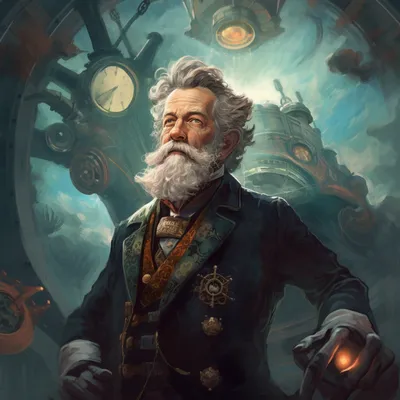Jules Verne
From the depths of the ocean to the heart of mysterious jungles, from the moon's barren landscape to the earth's core, no realm was off-limits for the master of extraordinary voyages, Jules Verne.
Born on February 8, 1828, in Nantes, France, Verne would become the herald of the literary genre known as science fiction. Young Verne's love for adventure was kindled by the bustling maritime activity of Nantes. His passion for storytelling was evident early on. Defying his father's wishes to follow in his footsteps as a lawyer, Verne chose instead to create tales that transcended boundaries.
After moving to Paris in his early twenties, Verne's literary career began to take shape. Despite early financial struggles, he persisted, nourishing his insatiable curiosity for science, geography, and technology. His breakthrough came in the form of "Five Weeks in a Balloon," published in 1863, which established him as a distinguished author.
Verne's subsequent works, collectively known as "Voyages Extraordinaires," demonstrated his unique ability to blend scientific facts with spellbinding narratives. "Twenty Thousand Leagues Under the Sea," "Journey to the Center of the Earth," and "Around the World in Eighty Days" remain his most celebrated creations. Captain Nemo, Phileas Fogg, and Professor Lidenbrock, among his many characters, were crafted with such vivid realism that they seemed to leap off the pages.
Verne's tales teemed with ingenious inventions and stunning discoveries, often presaging future technological advancements, such as electric submarines and lunar modules. Besides writing, Verne harbored a deep love for the sea. He owned a series of yachts and often sailed to various ports, a hobby that significantly enriched his maritime novels. He was also a member of the city council of Amiens, a testament to his commitment to public service.
Verne's works are not merely tales of adventure but are also thoughtful explorations of the human spirit and its relationship with science and nature. His narratives often reflected a sense of optimism towards scientific progress while cautioning against its reckless use.
Jules Verne breathed his last on March 24, 1905. Yet, his stories, charged with the spirit of exploration and discovery, continue to ignite the imaginations of readers worldwide. Verne's legacy lies not only in his fantastic voyages but also in the horizons of possibility he revealed, demonstrating that with imagination, even the furthest frontiers can be reached.
Read more on Wikipedia












